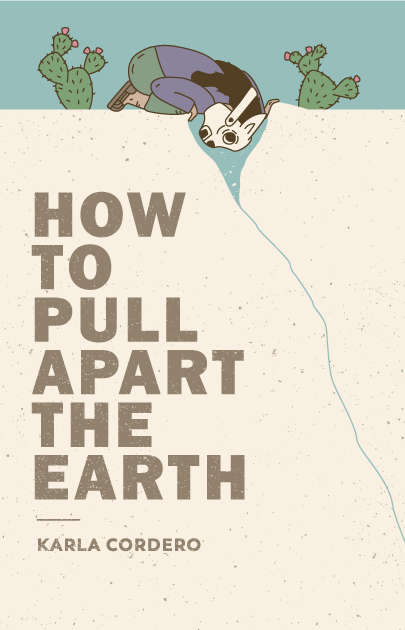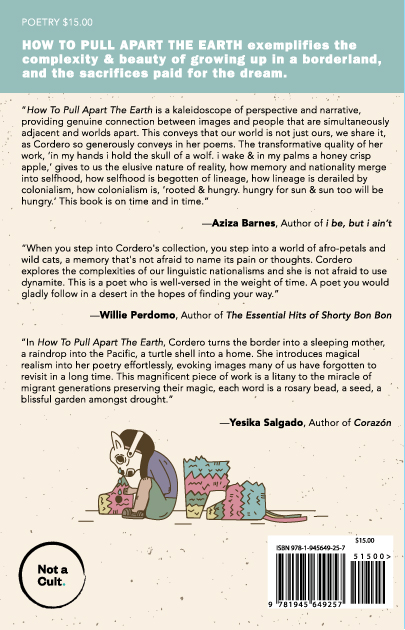Books
How To Pull Apart The Earth
Not A Cult. publishing
HOW TO PULL APART THE EARTH is an homage to the intrinsic thread that weaves the culture of Mexico together with the United States, and the echo of colonization that works to erase it. Cordero skillfully exemplifies the complexity & beauty of growing up in a borderland, and the sacrifices paid for the dream.
“Karla Cordero is a poet who knows that words can dance, even over an earth as distressed as ours. Here is a stunning collection of sweet things gone sour, of ghosts and borders, chopping blocks and the hands that haunt them. These poems are full of patience, and full of fire.”
— Bao Phi, Author ofThousand Star Hotel
“How To Pull Apart The Earth is rich. Lush and filmic, akin to the style of "Y Tú Mama Tambien," you think you've witnessed the full picture until the artist reveals a kaleidoscope of perspective and narrative, providing genuine connection between images and people that are simultaneously adjacent and worlds apart. This conveys that our world is not just ours, we share it, as Cordero so generously conveys in her poems. The transformative quality of her work, "in my hands i hold the skull of a wolf. i wake & in my palms a honey crisp apple," gives to us the elusive nature of reality, how memory and nationality merge into selfhood, how selfhood is begotten of lineage, how lineage is derailed by colonialism, how colonialism is, "rooted & hungry. hungry for sun & sun too will be hungry." This book is on time and in time.”
—Aziza Barnes, Author of i be, but i ain’t
“When you step into Cordero's collection, you step into a world of afro-petals and wild cats, a memory that's not afraid to name its pain or thoughts. Cordero explores the complexities of our linguistic nationalisms and she is not afraid to use dynamite. This is poet who is well-versed in the weight of time. A poet who you would gladly follow in a desert in the hopes of finding your way.”
—Willie Perdomo, Author of The Essential Hits of Shorty Bon Bon
“In How To Pull Apart The Earth,Cordero turns the border into a sleeping mother, a raindrop into the Pacific, a turtle shell into a home. She introduces magical realism into her poetry effortlessly, evoking images many of us have forgotten to revisit in a long time. This magnificent piece of work is a litany to the miracle of migrant generations preserving their magic, each word is a rosary bead, a seed, a blissful garden amongst drought.”
—Yesika Salgado, Author of Corazón
Grasshoppers Before Gods
Dancing Girl Press
“Karla Cordero’s Grasshoppers Before Gods (dancing girl press & studio, 2016) burns in the Southern California heat. It is a mouth dry with desert dust. It is a powerful lament (My country/ licks the cheeks of a boy/ they shot/ & another boy they shot/ & when they shot a third boy/ My country/ like a lost dog/ slept*); it is a testament to heritage and the female self (There are wounded sparrows between my lips,/ a choir in shackles, broken beaks & rusted tongues,/ new scars behind feathered backs, caged-throats/ screaming for privilege,/ turns parrot color mocking a white kid’s tune.**)
Karla Cordero’s Grasshoppers Before Gods is beautiful, rapt with imagery so specific it sticks with you long after you’ve put the book away.”
—Kolleen Carney Hoepfner, Editor-in-Chief, Drunk Monkey’s
“When I think of Grasshoppers Before Gods by Karla Cordero, I am reminded of Gloria Anzaldua’s Borderlands: La Frontera. I am reminded of Lizz Huerta’s mesmerizing prose when, from “I Succubus,” she enchants, “Even when they think they aren’t, men love to reenact conquest on bodies like mine. Bodies like mine have been taken for centuries. I take back.” I am reminded of Natalie Diaz’s recent collection When My Brother was an Aztec. What do these writers have in common? They possess the sharp wit and unconquerable strength to stand against aggression barbwired by dominant society. Since today’s cultural, political and social climate is in upheaval, a closer look at how Cordero crafts her language in her new chapbook brings forth a sense of urgency. Cordero’s personal history moves outward to the larger conversations of racism, social justice, and equality.”
—Arthur Kayzakian, Editor, The B-Side


